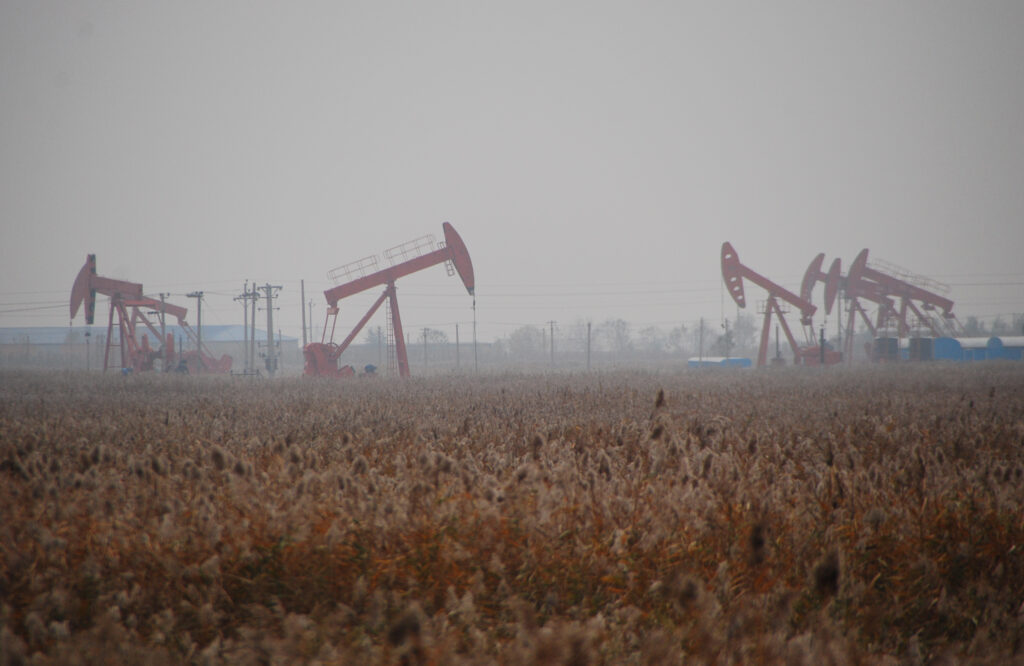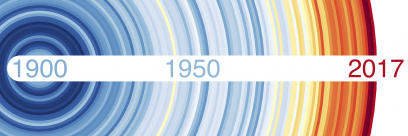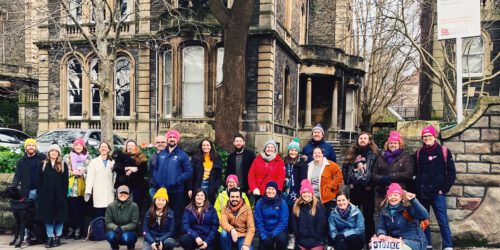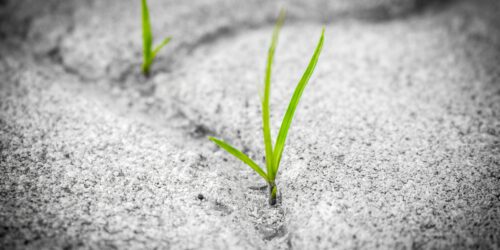The Ways We Work: Part 1, Oily Entanglements

This three-part series of posts on “The Ways We Work” will explore the intersections of climate-informed research and the labour practices that undergird contemporary universities, with a particular focus on North America. We hope it serves as an invitation to the field of environmental history to think about sustainability as both a methodological question and one of intersectional labour practices.
In this first post, we assess current gaps between our values and practices in the university by looking at both archival research methods and wider funding regimes. The second part of this series extends these observations through the concept of extractivism. On the basis of this framework, the third and final part of the series offers thoughts and directions for a better future for the climate and for workers, arguing that redress for long-standing equity and sustainability problems can be best developed in tandem.
We write as a group of emerging scholars working in Canadian universities on the coast of British Columbia, southern Ontario, and the island of Newfoundland. Together we are a part of the Low-Carbon Research Methods Group, a network of scholars exploring the impacts of climate change on our methods and working conditions in academia. We hope this provocation can serve as an invitation to build collaborative networks of scholarly exchange and collective action across disciplines to address climate change, as well as the highly-precarious working conditions so many of us are trying to survive.
Oil and the Archives
Historians are surely familiar with the archive’s constitutive role in building or sinking research prospects, as well as the social recognition and personal thrills that come from “discoveries” in dusty boxes and tapes. The metadata and institutional care afforded by formal archives makes some kinds of historical projects easier to do than others, and creates mobility demands that pull researchers to different corners of the world in pursuit of the right archival file. While digitization has shifted these norms to many useful degrees—especially during the pandemic—the vast majority of archival materials remain locked in paper and lack comprehensive and searchable finding guides. As a result, historians get on a lot of airplanes to pursue potential findings in far away places. This both produces considerable carbon emissions and means that the field, structurally, rewards scholars with certain kinds of institutional and personal resources at the expense of others.
To illustrate some of the carbon entanglements in academia, we invite you to imagine with us the academic lives of two scholars—”H” and “S”—and the ways they encounter carbon in their institutions.
H is a tenure-track humanities scholar who frequently travels to conduct archival research on environmental history. As a scholar whose work involves climate change, H knows that the future ought to include far less carbon-intensive flying. Although they are increasingly uneasy about it, the job seems to require air travel. H has had to push carbon concerns aside, while juggling research proposals, a book project, and papers for upcoming conferences several time zones away. H works within a space of tension: to honour the university’s values often requires compromising H’s own. As for the university, it has never questioned the number of H’s flights or attempted to quantify the carbon emissions produced. But, if they were to check, it would probably amount to something like two-thirds of H’s overall work-related emissions.
At a similar university, we find graduate student “S” whose grant-funded research is undergoing review by the university’s department of research ethics. S has expressed confusion about the institution’s definition of ethics. Many of S’s findings will predictably expose carbon-related injustices, but those seem, from the standpoint of the approving bodies in the institution, decoupled from the carbon embedded in the proposed methods. S is both fascinated and baffled by the selective self-awareness of academia. How is it that we acknowledge trespass on unceded territories, and reveal our positionality, S wonders, but are not required to declare or defend the carbon in our choice of methods, even if it contributes to the very harms we research?
High-Carbon Archival Sprints and Their Alternatives
The pressure these scholars experience in the scenario above is familiar to many. Flying is a practice expected of these researchers, a means to access unique or rare materials. Getting to that obscure archive, and being the “first” to “discover” a primary source, can be key calling cards for one’s research project and personal credibility. Archival “finds” also help the business of the university: they bring in grant money, they become the focus of books published by university presses, and they bring prestige and attract external funding. This contributes to the cultural capital necessary to increase enrolment, which in turn secures financial capital to ensure the university’s continued existence. To mobilize knowledge and accumulate even more prestige, more flying is required to transport scholars to archives, conferences, guest lectures, and book launches—all events where they serve as ambassadors of their institutions.
Yet, more and more, some scholars are moving in a different direction. Perhaps H hears about colleagues through the grapevine who have stopped going to conferences that require getting on a plane, and wonders how they make it work. Scholars who decide that flying is a choice—not a mandate—might seem like outliers: rejecting a “fly or die” emphasis on speed and quantity is still, after all, a non-normative choice. However, there are an increasing number of academic institutions declaring their efforts to reduce flying. And some scholars have seen specific benefits. Meredith Conti describes the serendipitous discoveries afforded by slower-and-lower travel, and the “expansive critical thinking” time available when using land-based travel modes to arrive at research sites. These approaches are not feasible for all scholars in all circumstances, but they do present themselves to H as cause for consideration. What would it mean to fly less?
H worries that it would mean giving up a lot: letting geography, rather than intuition, guide their archival work and potentially reusing a lot of sources that are already well-known and well-studied in their subfield. H worries that they might not “discover” anything new, and so lose prestige in their peers’ eyes.
But this orientation towards discovery also comes with its costs. H remembers well the breakneck pace of their dissertation research. Rather than an open, exploratory process of documents and documentation, attending to the organizational and epistemic legacies that structure the archive (at least while in the archive), H was rushed to get in, grab as much as possible, and get out. With limited graduate funding and narrow time windows, that’s really all they could do. Common references to “mining the archive” or “hacking the archive” perhaps speak to a wider truth: this is often an extractive process. For most, archives are places where we go to find things and take them away as our personal intellectual property, not sites of reciprocal exchange or guided learning.
S feels similar pressures, but seeks different solutions. S has already been in touch with a scholar who has worked in their archive before, as well as a fellow grad student who lives in the distant city where this archive is housed. The former shared a lot of the scans they took from a previous visit; S uses them to confirm a hunch about the materials, which they subsequently used to direct their local contact to scan a few more documents for a fair hourly rate. The three scholars are now in closer contact, sharing resources and discussing potential future collaborations. In feeling their way towards lower-carbon research methods, S has ultimately gained more than they have given up.
High-Carbon Funding and Petro-Structures in the University
But personal decisions like these require a fair bit of serendipity and social networking. This isn’t always the case, nor is it a robust model of wider structural change. For that, we need to consider how high-carbon research gets locked in before plane tickets are ever bought. And so the target of our final carbon critique in this post is as soaked in power as it is in oil: research funding.
At the beginning of this post, S expressed concern that the “ethics” of the university don’t seem to account for the ethical harms enacted by research that is fossil-fueled. Like many academics, S’s research is generously funded by a national body whose ability to finance graduate students in part relies on profits from the fossil fuel industry. In fact, the everyday academic spaces where knowledge-producers work and study are often funded by a variety of extractive industries. Some are keen to put their company logo on the door of a building or the wall of a lecture theatre; others are quieter, more invisible and more targeted in their support. This raises problematic questions of transparency, especially at a moment when institutions are starting to establish Climate Sustainability Offices to liaise with upper management, key stakeholders, faculty, and “knowledge users.” At S’s institution, the senior leadership (faced with tighter budgets and decades of government underfunding) frames its new sustainability work as part of a balance between maintaining the financial health of the institution and environmental well-being. How is one to know where the interests of oil might be helping to set the parameters of the institution’s new sustainability mission—and therefore the scope of potential solutions? How loud is carbon’s voice, and where does it lurk?
These concerns are not unfounded, according to Benjamin Franta and Geoffrey Supran who provocatively claim that academic institutions are being taken over by Big Oil. Their article describes a fossil fuel industry that deliberately and systemically entangles itself in the funding of academic institutes and research centres as part of a strategy to normalize, expand, and provide social license for fossil fuel extraction. For Franta and Supran, the backing provided by Big Oil to academic research is akin to the conflicts of interest created by Big Tobacco. Whether research funded by petrochemical dollars (directly or indirectly) can be considered independent certainly varies from case-to-case, but the larger question remains: how does carbon structurally shape conditions of knowledge production, and what possibilities for transition might it foreclose?
Beyond overtly oily influences, high-carbon research is also woven into the more banal structures of university life. H and S’s travel budgets were hard-won by their unions, and administered in ways that make them resistant to repurposing for other ends. These scholars’ grant funders also expect a high degree of travel, and are more keen to reward new finds than reengagements with old materials. Distant travel is regarded favourably in H’s tenure dossier. And archives themselves are wary of their contents circulating too freely, between privacy concerns and donor restrictions, and the need for reproduction fees that subsidize their already thin budgets.
So S and H wonder: what can I possibly do about arrangements that are brokered at institutional levels far above me? Awareness is a starting point: to find out where the carbon lurks on campus, and to ask what it’s doing and what might be its longer term purpose. And once inside the institution, where does this carbon flow? How can this knowledge be put into action? Academic workers like S and H might join the Divestment Canada Coalition (DCC), one of many collective forces achieving low-carbon policy change within academic institutions. Divestment campaigns are also key focal points for analyzing the oil entanglements of contemporary universities and bringing these conflicts of interest into the moral light. They can erode the social license donors seek to buy, and raise the stakes for new or marginalized sustainability officers.
Academics can also foster institutional reflection and reform. They could chat up their chairs, sustainability officers, and provosts, urging them to collect and visualize data on academic flying. That data can lead to wider discussions and debate across the university, pulling in stakeholders and also other institutional check points, such as the ethics and finance offices or their respective unions. They might also bring resolutions forward to their wider academic societies and funding bodies, calling for greater remote access policies and working groups to explore lower-carbon methodologies. And across these scales they might continue to ask how the money currently bookmarked for air travel might be redirected to better support graduate research assistants and archivists working with the materials researchers wish to use. Perhaps in this intersection of method and funding there are ways to better sustain, rather than mine, the archives.
There are no guaranteed outcomes of such conversations, but it does seem past time to have them. The ravages of climate change are ever-more acute and unequally felt on several registers. Globally, the loss of biodiversity from carbon-driven climate extremes threatens human and nonhuman well-being. It’s also the case that the negative consequences of high-carbon travel are more likely to affect colleagues in developing regions rather than the Global North, deepening inequities across international research networks (and in general). Finally, there is also the question of preserving the archives in the face of carbon-caused weather extremes. Extreme weather and thermal stress jeopardize the very source of primary data an archival researcher uses to build their career (Mazurczyk et al. 2018) and, despite strategic disaster preparedness, archival losses caused by extreme weather are increasing. Archivists find themselves under increased pressure to guess which element might next degrade or destroy the collections in their care (Traister 2005). Preparing for each possible scenario requires a diversion of funds that might have otherwise helped enhance rather than simply protect the archive. One U.S. archive manager describes archival loss in the face of climate extremes as “a failure of imagination” (Mazurczyk 2018).
Avoiding “a Failure of Imagination” through Collective Imagining
H and S’s paths will cross for years at conferences and through published research. These encounters are often unplanned and fleeting. But they could be more deliberate. Perhaps H will one day join the orbit of S’s archival collaborators, exchanging documents as well as creative strategies to better fund archives and their local research communities instead of airline and oil companies. The success of this collaboration, and institutional reforms across universities, could encourage more such networks in and around different archives, and eventually become a more formal association that strives to give back more than it takes.
Carbon action will require collective imagining, an interconnected solidarity that distributes the labour of decarbonizing our methods, and perhaps, in the process, improving them. In our next post, we will dive deeper into some of the structural barriers that silo university researchers, creating the conditions under which we have been forced to act alone. Looking more closely at the elephant in the room–labour–can help us imagine ways forward to building the university otherwise.
Acknowledgements
We would like to thank the participants of the Low-Carbon Research Methods Workshop, which ran online in July 2021. This series of blog posts wouldn’t have been possible without the rich interdisciplinary conversations and textured collaborations that emerged from the workshop. We’d also like to thank our wider network of interlocutors and co-conspirators who have shared their methods, practices, friendship, and low-carbon ideas.
References
Conti, Meredith. “Slow Academic Travel: An Antidote to “Fly Over” Scholarship in the Age of Climate Crisis.” Theatre Topics, 31, 1 (March 2021): 17-29.
Franta, Benjamin and Geoffrey Supran. “The fossil fuel industry’s invisible colonization of academia.” The Guardian (March 13, 2017).
McCabe, Samantha. “Inside the student-led movements urging Canadian universities to divest from fossil fuels.” Maclean’s. (October 29, 2021).
Mazurczyk, T., N. Piekielek, E. Tansey, and B. Goldman. “American archives and climate change: Risks and adaptation.” Climate Risk Management 20 (2018): 111-125.
SCMS Environment and E-Waste Committee. “Proposed Plan to Reduce Environmental Impacts and Improve Society Equity and Accessibility” (March 2021).
Traister, Rebecca. “History is being flooded, too.” Salon (September 10, 2005).
Trisos, Christopher, and Alex Pigot. “Climate change could cause abrupt biodiversity losses this century.” The Conversation (April 9, 2020).
Whitford, Vanessa. “Divestment Gap Emerges.” Inside Higher Ed (April 28, 2021).
“Academic Air Travel Reduction and Offsetting Projects.” Google Maps. Last updated November 2021.
Wynes, Seth and Kimberly A. Nicholas. “The climate mitigation gap: education and government recommendations miss the most effective individual actions.” Environmental Research Letters 12 (2017).






3 Responses